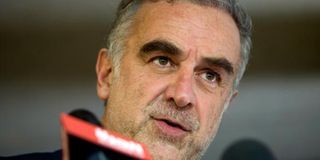Ocampo itching to prosecute Kenyans

Mr Luis Moreno-Ocampo, the ICC chief prosecutor at The Hague. Photo/REUTERS
International Criminal Court prosecutor Luis Moreno-Ocampo would cherish the prosecution of Kenya’s post-election violence suspects.
The man nurses an insatiable appetite to take on the rich and powerful. In fact, that is how the 57-year-old Argentine earned the job of the world’s most powerful prosecutor.
While he worked as prosecutor in Argentina between 1984 and 1992, Moreno-Ocampo tried senior military commanders for mass killings in what was dubbed the “Trial of the Juntas.”
Senior commanders
Nine senior commanders, including three former heads of State, were prosecuted and five of them convicted.
In 1987, he helped US prosecutors extradite General Guillermo Surez Mason to Argentina. He also defended controversial figures, such as football star Diego Maradona.
Literature on him projects the criminal lawyer as a brave man with unshakeable conviction, keen to demonstrate the potency of his willpower.
When he joined the ICC in 2003, there were two general fears: That he was a frivolous prosecutor presenting frivolous cases, or an impotent one unable to carry out investigations and get suspects arrested. He believes he has surprised many doubting Thomases.
“Within six years, I have opened investigations on the gravest cases under my jurisdiction, and obtained warrants of arrest against 13 individuals.
Four leaders of four different militias are in prison,” he said in a recent interview.
But what should be more scaring to the violence suspects is his determination to use Kenya as example for fighting impunity in the region. He has declared that no one would be immune from prosecution before the ICC.
“Politicians, businessmen or security officers may all potentially be brought to account in accordance with their criminal responsibility,” he said recently. As he indicated, the suspects will face charges relating to crimes against humanity.
ICC is mandated to hear cases on genocide, war crimes and crimes against humanity.
Besides, Mr Moreno-Ocampo, who is convinced that post-election violence was pre-planned, has made it clear that some of the suspects would be arrested within one year, as happened, for instance, to Jean-Pierre Bemba of the Democratic Republic of Congo (DRC).
He has opened investigations into crimes in northern Uganda, the DRC, the Central African Republic and Darfur.
The ICC has issued a warrant of arrest against Sudanese President Omar-al-Bashir, a decision that has been criticised.
There has been the argument that by going public about the arrest warrant, the prosecutor jeopardised efforts to seize the Sudanese warlord.
Instead, it is being argued, the prosecutor should have sought a sealed warrant, which could be executed when Mr Bashir travels abroad.
Some of his critics accuse him of making “political misjudgements”, and have dismissed him as an ill-informed publicity seeker.
To illustrate their claim, they cite the decision of the court’s trial chamber to halt Mr Moreno-Ocampo’s first prosecution and free the Congolese defendant Thomas Lubanga, a ruling which is now under appeal. The prosecutor had refused to surrender critical information required by the defence.
The other is a decision by the ICC judges to withdrew genocide charges against the Sudanese leader.
But nothing has threatened the law professor’s career at the ICC as allegations put to an internal panel of judges that Mr Moreno-Ocampo was guilty of sexual misconduct.
The complaint was considered by a panel of three judges from the court.
They interviewed the alleged victim. She firmly denied the allegations — as did Mr Moreno-Ocampo — and the complaint was dismissed as “manifestly unfounded” in December 2006.




